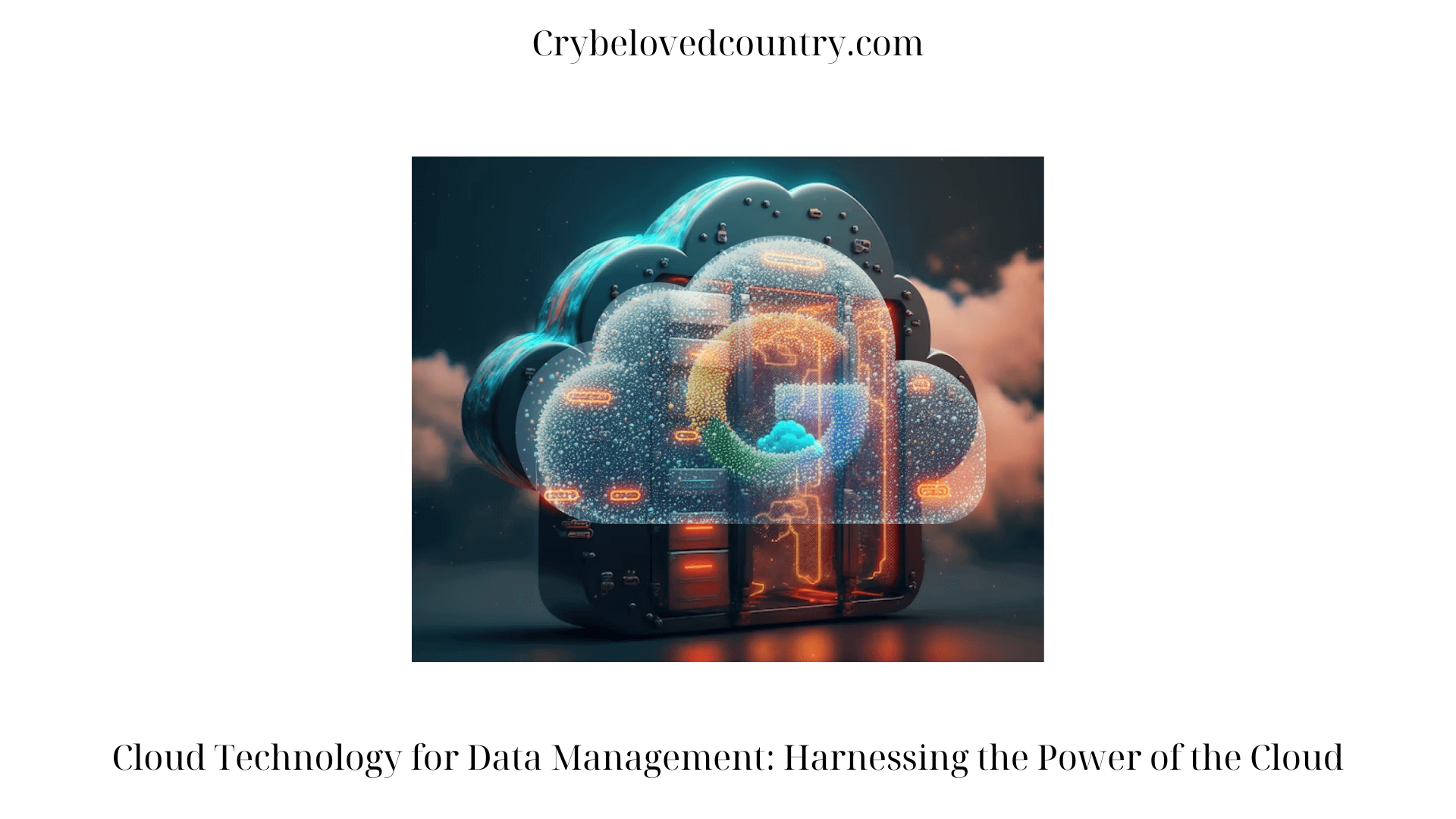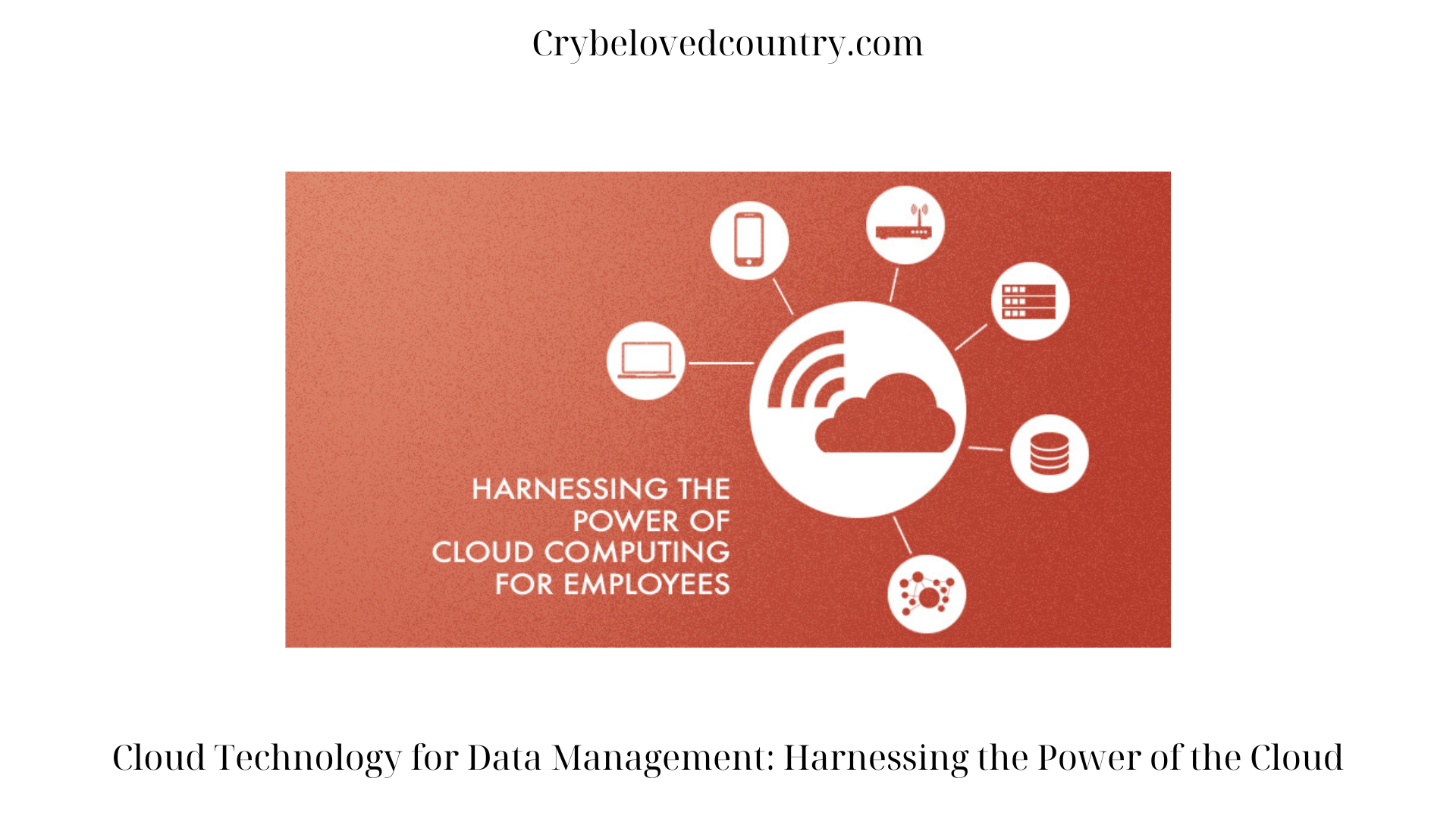In today’s digital age, data management has become a critical aspect of business operations. As organizations deal with exponentially growing volumes of data, it is crucial to find efficient and scalable solutions to store, process, and analyze this information. This is where cloud technology comes into play. Cloud technology offers a powerful and flexible platform for data management, enabling businesses to leverage its benefits for enhanced efficiency, cost-effectiveness, and accessibility. In this article, Crybelovedcountry will explore the concept of cloud technology for data management and delve into its potential advantages and considerations.
Cloud Technology for Data Management: Harnessing the Power of the Cloud

Understanding Cloud Technology for Data Management
Cloud technology refers to the delivery of computing resources, such as storage, processing power, and software applications, over the internet. Instead of relying on local infrastructure, businesses can access and utilize these resources remotely, using a network of servers hosted by cloud service providers. Cloud technology offers several deployment models, including public, private, and hybrid clouds, each with its own advantages and considerations.
When it comes to data management, cloud technology for data management provides a range of benefits. Firstly, it offers virtually unlimited scalability, allowing businesses to expand their data storage and processing capabilities as their needs grow. This eliminates the need for investing in expensive on-premises infrastructure that may become obsolete in a short period of time. With cloud technology, businesses can dynamically scale their resources up or down, based on demand, ensuring optimal utilization and cost-efficiency.
Secondly, cloud technology enables seamless cloud technology for data management accessibility. Since data is stored in the cloud, authorized users can access it from anywhere, at any time, using a variety of devices. This flexibility is particularly advantageous for businesses with distributed teams or remote workforce, as it fosters collaboration and empowers employees to make data-driven decisions regardless of their physical location. Additionally, cloud-based data management eliminates the need for complex and time-consuming data transfer processes, as data can be accessed and shared in real-time.

Advantages of Cloud Technology for Data Management
- Cost-Effectiveness: cloud technology for data management eliminates the upfront costs associated with purchasing and maintaining on-premises infrastructure. With cloud-based data management, businesses pay for the resources they use, making it a more cost-effective solution, especially for smaller organizations or startups with limited budgets. Additionally, cloud service providers handle infrastructure maintenance, reducing the need for in-house IT resources.
- Scalability: cloud technology for data management offers unparalleled scalability, allowing businesses to easily scale their data storage and processing capabilities up or down as needed. This ensures that organizations can adapt to changing data volumes and demands without disruptions or delays. Whether it’s a sudden surge in data or a need for additional computing power, the cloud can accommodate these requirements seamlessly.
- Data Redundancy and Disaster Recovery: cloud technology for data management providers often have robust data redundancy and backup mechanisms in place, ensuring that data is replicated across multiple servers and locations. This redundancy minimizes the risk of data loss due to hardware failures or natural disasters. In the event of an incident, cloud-based data management enables faster data recovery and minimal downtime.
- Security: cloud technology for data management providers invest heavily in ensuring the security of their infrastructure and data centers. They employ advanced security measures, such as encryption, access controls, and intrusion detection systems, to protect data from unauthorized access or breaches. Cloud technology often provides better data security than traditional on-premises systems, particularly for businesses with limited IT resources.

Considerations for Cloud-Based Data Management
While cloud technology for data management offers numerous advantages for data management, there are several considerations that organizations should keep in mind:
- Data Privacy and Compliance: Businesses need to ensure that their cloud technology for data management practices align with relevant privacy regulations and compliance requirements. When adopting cloud technology, it is essential to choose a reputable cloud service provider that adheres to industry standards and provides robust security and privacy controls.
- Internet Connectivity and Reliability: cloud technology for data management relies on a stable and reliable internet connection. Organizations should assess their internet infrastructure and evaluate potential risks or limitations that may impact data accessibility or performance. Having backup connectivity options in place can help mitigate the risk of disruptions.
- Vendor Lock-in: Moving data to the cloud involves a level of dependency on the chosen cloud service provider. It is crucial to consider the potential implications of vendor lock-in and ensure that data can be easily migrated or transferred to alternative platforms if needed. Interoperability and data portability should be key considerations when selecting a cloud provider.
- Data Transfer and Migration: Transferring large volumes of data to the cloud can be time-consuming, especially if the cloud technology for data management internet bandwidth is limited. Proper planning and strategies for data migration should be in place to minimize disruptions and ensure a smooth transition to the cloud environment.
Conclusion
Cloud technology has revolutionized data management by offering businesses scalable, accessible, and cost-effective solutions. By harnessing the power of the cloud, organizations can efficiently store, process, and analyze vast amounts of data without the need for significant upfront investments in infrastructure. The advantages of cloud technology for data management include cost-effectiveness, scalability, data redundancy, disaster recovery, andenhanced security. However, organizations should carefully consider factors such as data privacy, internet connectivity, vendor lock-in, and data migration when adopting cloud-based data management solutions.
In conclusion, cloud technology for data management presents a transformative opportunity for businesses to optimize their data processes and drive innovation. By embracing the power of the cloud, organizations can unlock new levels of efficiency, accessibility, and scalability in managing their data assets. As technology continues to evolve, the cloud will undoubtedly play a crucial role in shaping the future of data management, enabling businesses to stay agile, competitive, and data-driven in an increasingly digital world.
